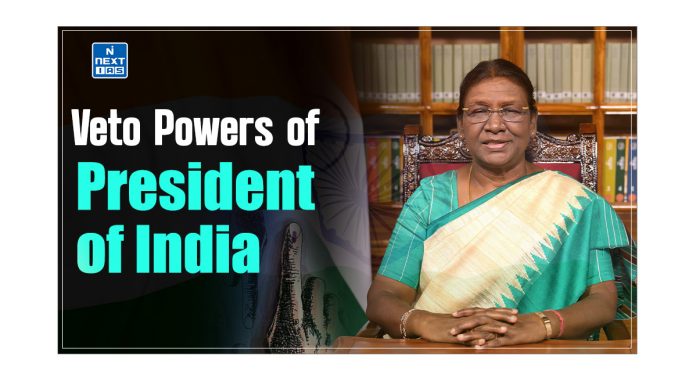

The Veto Power of President of India stands as a cornerstone of the nation’s legislative framework. Along with allowing the President of India to perform its legislative functions, it offers a crucial mechanism for upholding constitutional integrity and ensuring the alignment of enacted laws with the broader interests of the nation. This article of NEXT IAS aims to study in detail the Veto Power of the President of India, its meaning, objectives, types, and other related concepts.
In the context of legislation, “Veto Power” refers to the authority granted to an individual or body, typically the Executive Head, such as a President or Governor, to unilaterally refuse or reject a bill passed by the legislature. It acts as a critical safeguard against unilateral legislative actions, giving the executive branch the ability to review and potentially reject laws passed by the legislature. Thus, it acts as a mechanism for checks and balances between the executive and the legislature.
The veto power enjoyed by the Executive can be classified into 4 categories:
The President of India, as the head of the state, has been assigned a vital role in the nation’s legislative process. To enable him to perform this role effectively, the Constitution of India has vested the President of India with veto powers.
Veto Power of the President of India refers to the constitutional authority given to the President to withhold or reject legislation passed by the Parliament or State Legislatures.
The constitutional provisions regarding the Veto Power of the President of India are as follows:
The objectives of the Veto power of the President of India are as follows:
The President of India is vested with three types of Veto Power:
| Note: The President of India does not possess a Qualified Veto. However, the American President possesses a Qualified Veto. |
The three types of Veto Power of the President of India are discussed in detail in the sections that follow.
| Note: The President has no Veto Power in respect of a Constitutional Amendment Bill. The 24th Constitutional Amendment Act of 1971 made it obligatory for the President to give his assent to a Constitutional Amendment Bill. |
If a bill passed by a State Legislature has been reserved by the Governor for the consideration of the President, the bill can become an act only if it receives the assent of the President. Thus, the President has been given veto power w.r.t. State Legislation as well.
As per Article 201 of the Indian Constitution, when a bill is reserved by the Governor for consideration by the President, the President has three alternatives before him:
The Indian Constitution has not prescribed any time limit within which the President has to make a decision with respect to a bill reserved by the Governor for his consideration. Thus, the President can exercise a Pocket Veto in respect of State Legislation as well.
| Central Legislation | State Legislation |
|---|
| With Regard To Ordinary Bills |
| Can be ratified. | Can be ratified. |
| Can be rejected (Absolute Veto) | Can be rejected (Absolute Veto) |
| Can be returned (Suspensive Veto) | Can be returned (Suspensive Veto) |
| Can be kept pending (Pocket Veto) | Can be kept pending (Pocket Veto) |
| With Regard To Money Bills |
| Can be ratified | Can be ratified |
| Can be rejected (Absolute Veto) | Can be rejected (Absolute Veto) |
| Can NOT be returned (NO Suspensive Veto w.r.t. Money Bill) | Can NOT be returned (NO Suspensive Veto w.r.t. Money Bill) |
| Can NOT be kept pending (NO Pocket Veto w.r.t. Money Bill) | Can NOT be kept pending (NO Pocket Veto w.r.t. Money Bill) |
| With Regard To Constitutional Amendment Bills |
| Can only be ratified, and can NOT be rejected or returned (NO Veto Power w.r.t. Constitutional Amendment Bill) | Not Applicable as Constitutional Amendment Bills cannot be introduced in the State Legislature. |
In conclusion, the Veto Power of the President of India is a significant tool for the head of the state to play a role in shaping legislation and safeguarding the Constitution. It fosters a deliberative process within Parliament, encourages thorough scrutiny and debate on proposed legislation, and ensures that laws passed by Parliament align with principles of justice, equity, and the rule of law. Thus, it underscores the importance of accountability and scrutiny in lawmaking, ultimately contributing to the strength and resilience of India’s democratic institutions.
The role of veto power, typically vested in the executive branch of government, is to provide a check on the legislative process by allowing the executive to reject or block legislation proposed by the legislative branch.
In 1986, President Zail Singh exercised the pocket veto with respect to the Indian Post Office (Amendment) Bill. This bill imposed certain restrictions on the freedom of the press.